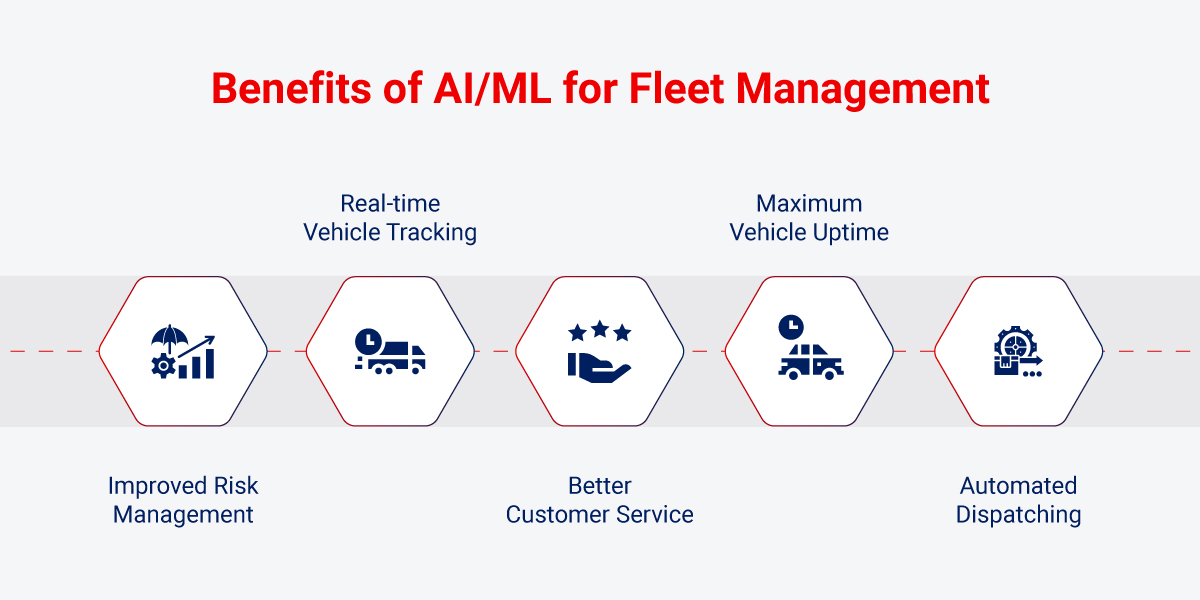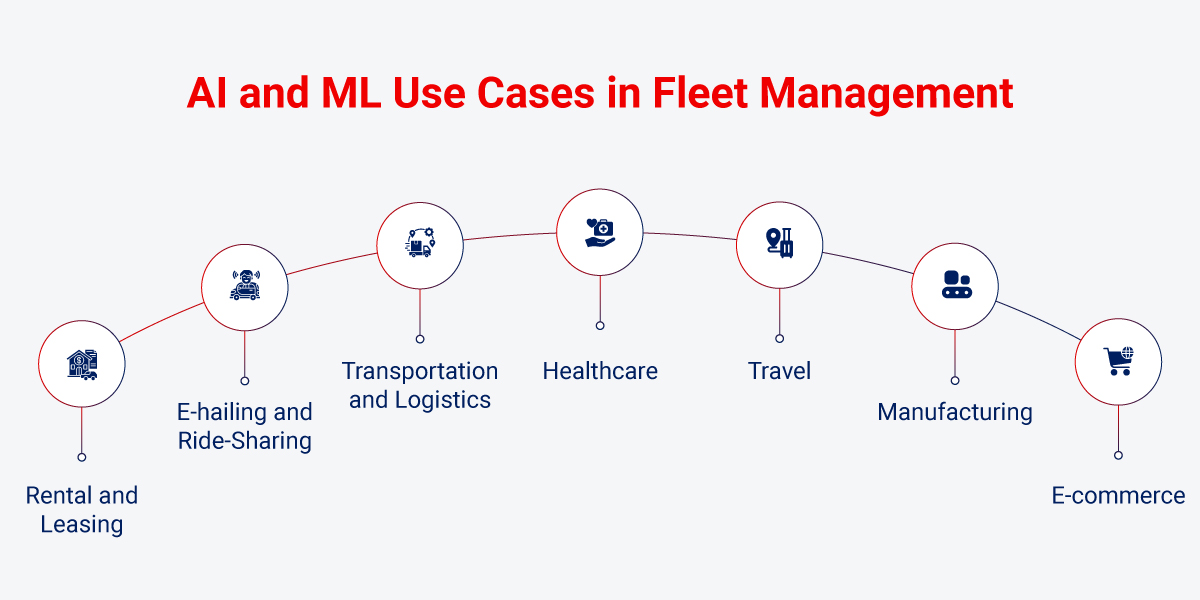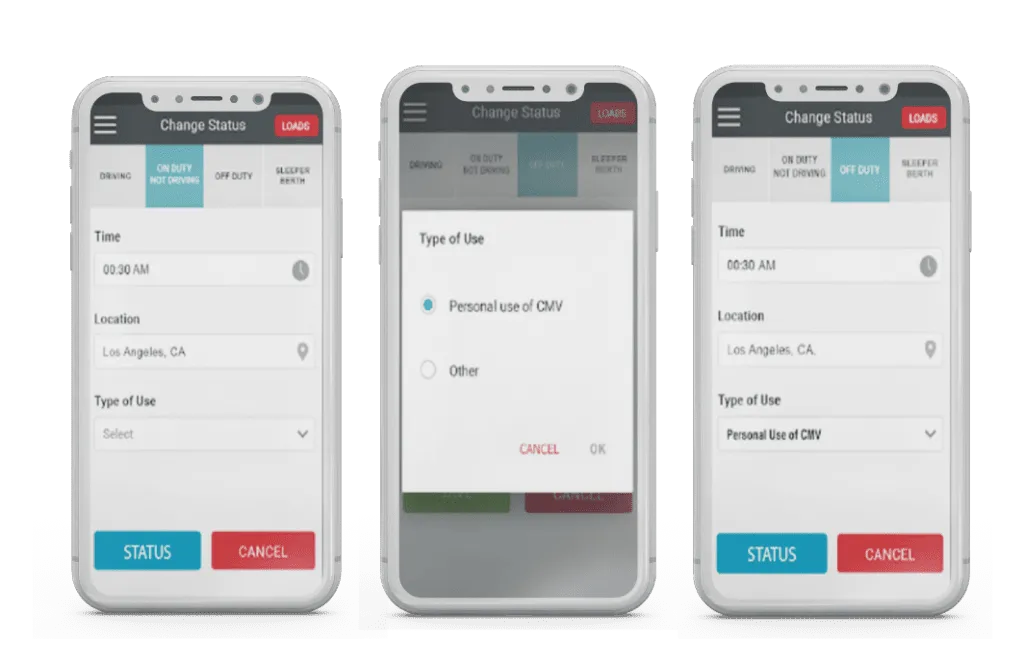Machine Learning (ML) – a subset of Artificial Intelligence (AI) is transforming almost every business vertical. For the transportation and logistics industry, machine learning in fleet management is revolutionizing operations and accelerating digital transformation while disrupting conventional processes. AI helps make fleet managers’ role more productive and streamlined. It helps them address business needs while supporting the adoption of new technology.
The heavy use of smartphones and telematics devices helps companies to leverage powerful AI-based applications. Innovative solutions help prioritize driver safety without compromising on cost and efficiency. It enables them to keep track of all the fleet operations and make timely decisions. They offer route recommendations to road risk analysis and even provide coaching to drivers. The combination of GPS and artificial intelligence makes drivers’ lives easier.
In this blog, we will take a closer look at how it will offer value to your business and enhance your fleet operations and safety by exploring the benefits, common use cases, and what the future of transportation could look like.
Critical Aspects of Fleet Management that AI/ML can Optimize
32%[1] of fleet managers believe that AI and ML will probably have the biggest impact on fleet management in the near future. From increasing fleet efficiency and reducing operational costs to improving driver and vehicle security, integrating AI helps transform data into a powerful strategic tool for navigating the complexities of the VUCA world. Here are some key aspects to consider:
Predictive Maintenance
AI-based solutions analyze a wide range of data from the vehicle with high accuracy – covering performance, mileage, and component wear rates. These systems employ ML models such as Random Forests to identify recurring patterns that signal impending failures to forecast maintenance needs with high accuracy. These also leverage digital twin technology virtual replicas of vehicles, enabling simulation-based maintenance predictions and optimization. This helps the fleet manager schedule proactive maintenance in order to reduce sudden breakdowns and minimize downtime.
Route Optimization
The integration of machine learning in fleet management has made it possible to process real-time traffic updates, weather forecasts, road closure information, and historical route performance. These AI-powered route planning platforms use sophisticated algorithms for dynamic routing to continuously adjust routes while considering factors like fuel efficiency and delivery time windows. This dynamic optimization leads to significant improvements in delivery efficiency and fuel economy.
Fuel Efficiency
AI-driven systems analyze various factors affecting fuel consumption, including driver behavior, vehicle specifications, and route characteristics. Based on the patterns in acceleration, braking, and idling across the fleet, they may recommend specific training for drivers or suggest vehicle modifications. Over time, implementing these AI-generated insights can lead to substantial reductions in fuel costs.
Fleet Safety and Compliance Management
Advanced AI-powered systems with telematics data and in-cab sensors monitor driver behavior in real-time, efficiently detecting driving conditions like harsh braking, rapid acceleration, or even drowsiness to advise drivers instantly. ML models process and analyze this data to predict safety risks, automate regulatory reporting, and generate proactive compliance alerts. By building detailed reports, fleet managers can track and improve overall fleet protection, lower accident rates, minimize compliance violations, and reduce associated costs.
Integrated Operations and 360 Degree Visibility
AI platforms collect data from all facets of fleet operations, such as GPS tracking, fuel cards, and maintenance records—not to mention external data like weather and traffic. By harnessing these different streams of information, AI provides fleet managers with real-time visibility into their operations, tracks real-time analytics, enables better decision-making, and highlights trends or issues that may not be easily apparent when looking at individual data sources.
Benefits Of Integrating AI and Machine Learning for Fleet Management
AI and machine learning in fleet management have redefined everything from route optimization and risk management to vehicle tracking and maintenance scheduling. Let’s look at some prominent benefits of these technologies in fleet management.

Improved Risk Management
According to a recent global survey of 1,800 fleet managers across 15 countries by Webfleet, 56%[2] of respondents said that integrating AI has enhanced driver protection, behavior analysis, condition-based maintenance, and asset management. AI systems continuously monitor vehicle performance and road conditions. They send out real-time alerts for risk prevention and provide predictive insights to avoid incidents, which enhances fleet security.
Real-time Vehicle Tracking
Advanced AI-powered GPS tracking systems provide precise, real-time location data on each vehicle. This allows managers to optimize routes, improve ETAs, and gain operational control. With a real-time view of current fleet positions and movement patterns, managers can make informed decisions.
Better Customer Service
Real-time tracking and accurate ETAs enable improved communication with customers. The integration of AI in fleet management can also help analyze customer feedback and service patterns to identify areas for improvement in heightened customer satisfaction.
Maximum Vehicle Uptime
Through smart maintenance and optimized scheduling, AI helps maximize vehicle availability at any given time and improves fleet capacity while reducing the need for backups.
Automated Dispatching
AI in fleet management handles complex scheduling tasks by accounting for driver availability, vehicle capacity, and delivery priorities. This automation reduces human error, enhances efficiency, and enables quick adjustments to changing conditions.
Use Cases of AI and Machine Learning in Fleet Management
AI and ML technologies have revolutionized fleet operations management across verticals. Listed below are just a few of the many examples of how AI is making it easier for fleet owners and operators to work smarter, stay compliant, and save more.

Rental and Leasing
- Advanced NLP-powered AI chatbots and virtual assistants make it easy for customers to rent cars. They can book rentals, ask questions, and get personalized recommendations.
- Smart maintenance uses AI to predict when cars need repairs. This helps prevent breakdowns and keeps customers happy.
E-hailing and Ride-Sharing
- AI connects riders and drivers quickly and efficiently. It considers location, availability, and preferences to find the best match.
- It also optimizes routes to avoid traffic and save time and money for both riders and drivers.
Transportation and Logistics
- Helps optimize delivery routes to avoid delays and deliver fuel savings. It considers traffic, weather, and other factors.
- AI-powered security systems integrate IoT sensors with cameras and driver identification tags to prevent cargo theft.
Healthcare
- AI helps optimize medical supply distribution routes to reduce transportation costs and ensure timely delivery to healthcare facilities
- Enables home healthcare providers to schedule visits and plan routes more effectively.
Travel
- Predicts travel demand so companies can have the right number of vehicles and drivers ready.
- Helps with dynamic pricing to adjust fares based on real-time demand.
- AI can enhance passenger protection by monitoring cameras and analyzing driver behavior through sensor-fusion technology.
Manufacturing
- Helps allocate vehicles and resources more efficiently to reduce idle time and costs.
- AI-powered load optimization creates an optimal load plan that prevents damage, maximizes capacity, and reduces loss.
E-commerce
- Hybrid algorithms optimize delivery routes dynamically for last-mile delivery by finding the best routes and delivery times.
- Analyze historical data and market trends to forecast demand with high accuracy so companies can plan their stocks and fleet capacity accordingly.
- Smart load management helps improve vehicle utilization while ensuring space is used efficiently.
Traditional vs. AI and ML-Powered Fleet Management Solution
Traditional fleet management relied on error-prone paperwork and simple tracking devices. Much of it was very labor-intensive and required a lot of guesswork. In contrast, AI and ML-powered fleet management solutions leverage advanced algorithms and data analytics to provide real-time visibility into fleet performance.
Let’s quickly compare traditional fleet management against AI-powered fleet management to better understand how AI-enabled solutions enhance performance and ROI:
| KPIs | Traditional Fleet Management | AI and ML-Powered Fleet Management |
| Data Collection | Manual tracking of vehicle data (mileage, fuel consumption, maintenance records) | Automated data collection from various sources (GPS, telematics, sensors) |
| Analysis | Basic data analysis and reporting | Advanced analytics, predictive modeling, and machine learning algorithms |
| Decision Making | Manual decision-making based on limited data | Data-driven decision-making, informed by AI insights |
| Task Automation | Limited automation (e.g., scheduling maintenance) | Extensive automation (e.g., route optimization, driver assignment, smart maintenance) |
| Efficiency | Moderate efficiency | High efficiency, reduced manual effort |
| Costing | Lower initial cost, higher operational costs | Higher initial cost, lower operational costs |
| Safety | Protective measures | Enhanced protection through driver behavior analysis, prescriptive maintenance, and accident prevention |
| Customer Satisfaction | Moderate customer satisfaction | Improved customer satisfaction through efficient operations and timely deliveries |
| Competitive Advantage | Limited competitive advantage | Significant competitive advantage through data-driven insights and advanced capabilities |
The Impact of AI and ML on Your Fleet Business
These advanced technologies play a major role in real-time data analysis, condition-based maintenance, and intelligent routing that allow fleet managers to make informed decisions and improve service delivery. Here are a few recent statistics and insights highlighting the impact of artificial intelligence in fleet management:
Cost Reduction
Around 52%[3] of respondent fleet managers agree AI’s ability to cut fleet operational costs as the most compelling reason for investing in the technology. This prevents expensive breakdowns and saves fuel.
Reduced Accident Rates
AI helps reduce the likelihood of accidents by sending audible in-cab alerts for risky behaviors like tailgating, distracted driving, or driving while drowsy. According to a recent report, integrating AI dashcams helped improve driver security by 73%[4] and reduced accident costs by 48%, making driving safer. They watch for tired or distracted drivers and give instant feedback. Amazon’s Automated Vehicle Inspection (AVI) technology uses stereovision to automatically inspect and identify even the minutest anomalies in Amazon delivery vans within a few seconds[5]. This technology finds hidden damage patterns to give fleet managers insights that improve the fleet’s security.
Productivity Gains
According to a survey, 62% of fleet managers agree that AI helps optimize route planning and logistics. This means faster deliveries and more efficient use of vehicles.
Fuel Efficiency and Emissions Reduction
According to a study by MIT, integrating AI reduces fuel consumption by up to 18% and carbon dioxide emissions by 25%[6] while improving average vehicle speed. This helps fleets meet green goals by cutting extra miles and teaching eco-friendly driving.
How is AI (ML) Integrated with Fleet Management?
The sheer volume and velocity of data from on-vehicle sensors and the wider IoT range demand the integration of much more intelligent management systems to help keep pace. The dedicated and integrated software is a unified system made up of several components and apps such as the Internet of Things (IoT), predictive data analysis, machine learning, HD cameras & sensors, Wi-Fi, and more.
Let’s try to understand the individual role each of these components plays as part of the holistic solution:
Machine Learning
This technology enables task forces to learn from data collected over time and make managed improvements based on that data. It builds intelligent systems in which the system can learn & improve upon decision-making capabilities to handle practical situations more effectively.
IoT and Edge Computing
It includes a network of actuators and sensors that collect data continuously. IoT applications ensure that enough data is taken for analysis while promoting the seamless sharing of information between all stakeholders of the supply chain, including retailers and manufacturers. For applications like IoT in fleet management, IoT enables real-time tracking, optimizing fleet performance and reducing operational costs.
The dedicated application for operations management uses three vital technologies:
- Wireless communication to convey relevant information
- GPS to track the real-time location
- Onboard Diagnostics scanners for self-diagnostics and reporting
- Edge computing for real-time data processing and decision-making
HD Cameras
This device ensures that video data can be captured, analyzed, and accessed at any time, anywhere. It leads to a better analysis of driver behavior, road conditions or hazards.
An AI-enabled Fleet Management system can perform the following activities:
- Gather precise road data and transfer it to other devices
- Transfer data across every arm in the supply chain
- Analyze data in real-time and recommend drivers for the best outcome
- Real-time analysis of driver behavior
- In case of accidents, capture the entire video footage from different angles
- Object recognition and hazard detection
How ML Fleet Management Will Shape the Future of Transportation?
While the automotive vehicle industry faces challenges as listed below that affects operations and business profitability, AI can potentially address these problems to create a better future for transportation.
- Resource efficiency and arranging
- Dangerous driving behaviors that lead to accidents
- Road risks
- Data collection and analysis
- Cost containment
- Compliance risk
AI and ML can streamline manual processes, deliver valuable insights and help businesses of all sizes become more productive with;
Valuable Insights Available at Fingertips
The high volume of data collected from onboard sensors, satellite tracking, and IoT devices may confuse the operators of larger fleets to find the most relevant data. With ML-enabled telematics systems, they can get the appropriate input and even guide their employees in real-time.
Automated Variance Detection
ML-enabled systems that feature advanced dashboards can offer visual displays of the data collected, allowing fleet managers to identify anomalies and drill into data easily. It would include exit misses, yawning habits, count blink frequencies and various signs of uncertain behavior. The inclusion of more parameters into this dataset would explain the real scenario and why the changes are occurring. These signals then reach the business managers in real-time, enabling them to take corrective measures at the right time.
Improved Maintenance Decisions
AI-based predictive technology can also learn to make intelligent predictions about the weather changes and detect changes in the environment. It would include fog, rain, cyclone before the driver reaches that destination. AI in Fleet Management can also help managers save costs through fuel economy and predictive maintenance.
Why Choose Us for AI and ML-based Fleet Management Software Development?
We leverage our expertise in Artificial Intelligence development services to provide custom fleet management solutions. This enables businesses to increase profits and achieve high ROI on investments.
- Deep Industry Expertise
Our industry-specific knowledge allows us to develop solutions that address real-world challenges faced by fleet managers daily. Our developers are skilled in the latest machine learning algorithms, predictive analytics, and AI-driven optimization techniques specific to fleet management applications.
- Scalable Architecture with Seamless Integration Capabilities
We design scalable architectures that can handle increasing data volumes and expanding fleet sizes without compromising performance. We also ensure that your fleet management software integrates smoothly with your existing ERP platforms and telematics devices. This ensures a connected ecosystem that maximizes efficiency across your entire operation.
Our agile approach means you’re involved throughout the development process, so the final product aligns perfectly with your vision and can adapt to changing requirements.
We’ve helped our clients achieve significant improvements in their fleet operations, including cost reductions, increased efficiency, and accurate EHS records.
Success Story: ELD App Doubles Fleet Efficiency and Boosts Profits by 62%
A renowned transportation company partnered with Rishabh Software to develop a comprehensive ELD fleet management mobile application. The client aimed to digitize their fleet operations and ensure compliance with ELD mandates while streamlining driver and vehicle management.

Challenge:
- Time-consuming manual fleet management leading to operational inefficiencies and high costs
- Lack of driver behavior monitoring and drive-time tracking affecting fleet performance
- Inability to monitor vehicle idle time and fuel consumption patterns
- Poor compliance tracking for federal fleet management regulatory requirements
Solution: Rishabh Software developed a custom Electronic Logging Device (ELD) app with IoT integration featuring real-time tracking, automated logs, and compliance monitoring.
Value Delivered:
- 100% automation of vehicle inspection reporting
- 2x optimization of fleet & driver efficiency
- 62% increase in overall fleet profitability
- Enhanced regulatory compliance
- Improved fuel management
Learn more about how this ELD Fleet Management Mobile App transformed fleet operations, enabling data-driven decisions and optimized performance through machine learning algorithms.
Frequently Asked Questions:
Q: What is Automated fleet management?
A: Automated fleet management refers to using technology to streamline and optimize the various operations involved in managing a fleet of vehicles. This consists of automating tasks like vehicle tracking, maintenance scheduling, fuel management, route planning, and driver monitoring.
Q: What are the key technologies behind AI-enabled fleet management?
A: Key technologies driving AI-enabled fleet management include:
- Telematics: For real-time tracking and data collection.
- IoT Devices: To connect vehicles and infrastructure for improved data exchange.
- Predictive Analytics: To forecast maintenance needs and optimize routes.
- GPS Tracking: This is used for accurate location data and route management.
- AI Algorithms: To analyze large datasets for driver behavior and vehicle performance insights.
Q: How can small businesses implement AI in their fleet operations?
A: Small businesses can start by investing in scalable telematics solutions, using cloud-based fleet management software, and gradually integrating AI-powered analytics for route optimization and maintenance planning. Partnering with technology providers can also help manage costs and complexity.
Footnotes:
1. https://press.bridgestone-emea.com/fleet-managers-expect-artificial-intelligence-and-electric-vehicles-to-have-biggest-impact-on-fleet-management-in-the-coming-years-global-webfleet-study-reveals/
2. https://press.bridgestone-emea.com/download/21bec37d-555e-4ac2-ad7b-c2127b6bd86d/wf-infographic-fleet-digitisation-future-trends-en-v42.pdf
3. https://webfleet.foleon.com/2024-webfleet-guides/fleet-digitisation-report/executive-summary
4. https://www.fleetmanagementweekly.com/wp-content/uploads/2023/11/VZC-2077702-2024-Fleet-Technology-Trends-R1_09292023.pdf
5. https://www.aboutamazon.com/news/transportation/amazon-automated-vehicle-inspection
6. https://news.mit.edu/2022/ai-autonomous-driving-idle-0517








